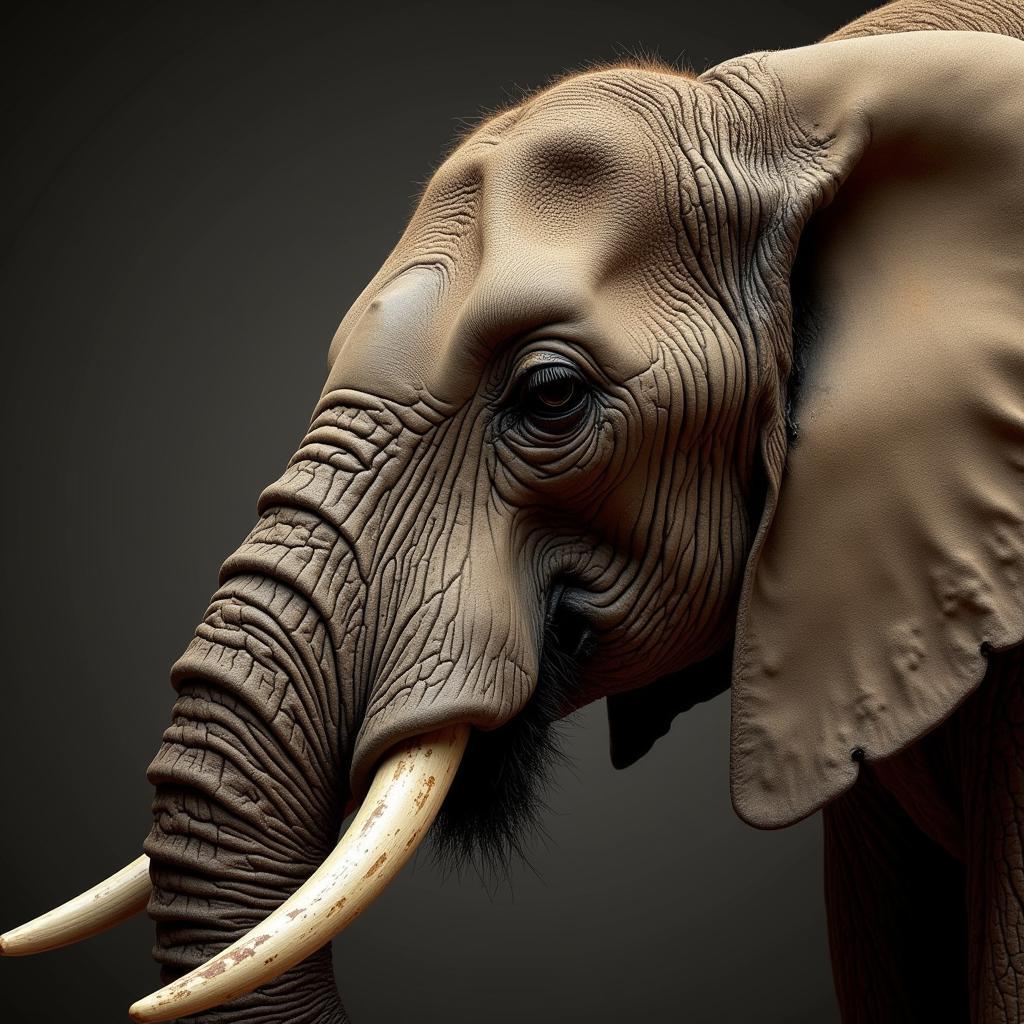Unveiling the Secrets of African Elephant Teeth
African Elephant Teeth are more than just impressive ivory tusks. They are vital tools for survival, playing a crucial role in the daily lives of these magnificent creatures. From foraging for food to digging for water, these remarkable teeth are essential for their existence in the diverse landscapes of Africa. Let’s delve deeper into the fascinating world of African elephant teeth and discover their significance. For more information about the different types of African elephant teeth, you can visit african elephant teeth type.
The Anatomy of African Elephant Teeth: More Than Meets the Eye
African elephants possess two types of teeth: tusks and molars. While the majestic tusks are the most prominent feature, the molars, hidden within their mouths, are equally important for their survival. Tusks are elongated incisors, continuously growing throughout their lifetime, composed of dentine, a hard, bony tissue. These ivory tusks serve various purposes, including defense against predators, digging for roots and water, and stripping bark from trees.
Molars, on the other hand, are responsible for grinding tough vegetation. Unlike human teeth, which are replaced once, elephants have a unique system of tooth replacement. They have six sets of molars throughout their life, each larger than the previous set. As the front molars wear down, they are pushed forward and eventually fall out, replaced by the next set emerging from the back of the jaw. This intricate process ensures that the elephants always have functional teeth for efficient chewing. Want to learn more about the names of African elephant teeth? Check out this resource: african elephant teeth names.
How Many Teeth Does an African Elephant Have?
At any given time, an adult African elephant typically has one molar in each quadrant of its jaw, totaling four molars in use. However, with the continuous replacement cycle, they will have up to 24 molars throughout their lifetime, albeit not simultaneously.
What Are the Tusks Used For?
Tusks are multi-purpose tools for African elephants. They use them for digging, defense, and even social interactions. The size and shape of the tusks can vary between individuals and even between the two tusks of the same elephant.
The Impact of Poaching on African Elephant Teeth
Sadly, these magnificent tusks have become the target of poachers, leading to a devastating decline in African elephant populations. The illegal ivory trade drives this cruel practice, threatening the future of these gentle giants.
Why Are African Elephant Teeth So Valuable?
The high demand for ivory in some parts of the world has made African elephant teeth a valuable commodity in the illegal trade market, pushing these animals towards extinction.
 Poaching Threat to African Elephants
Poaching Threat to African Elephants
Conservation Efforts to Protect African Elephant Teeth
Numerous organizations are working tirelessly to protect African elephants and their teeth. These efforts include anti-poaching patrols, community engagement, and raising awareness about the devastating effects of the ivory trade. Find out fascinating facts about African elephant teeth here: african elephant teeth facts.
What Can We Do to Help?
Supporting conservation organizations, educating ourselves about the issue, and refusing to buy ivory products are crucial steps in protecting these magnificent creatures. We all have a role to play in ensuring the survival of African elephants for future generations. You can also learn more about African elephant teeth sets here: african elephant theeth set.
Conclusion: Protecting the Future of African Elephant Teeth
African elephant teeth are essential for their survival, from the majestic tusks to the powerful molars. Understanding the vital role these teeth play underscores the urgent need for conservation efforts. By working together, we can protect these magnificent creatures and their incredible adaptations for generations to come. Let’s continue to learn about African elephant teeth and support the initiatives that protect them.
FAQ
- What are the main differences between African and Asian elephant teeth?
- How can I identify ivory?
- How do scientists study elephant teeth?
- What is the lifespan of an African elephant molar?
- What are the current regulations regarding ivory trade?
- Are there any sustainable alternatives to ivory?
- How does the loss of tusks impact an elephant’s ability to survive?
Common scenarios and questions:
- Scenario: You find an ivory item in an antique shop.
- Question: How can I be sure it’s not illegal ivory?
- Scenario: You’re planning a trip to Africa.
- Question: What are ethical ways to observe elephants in the wild?
- Scenario: You want to support elephant conservation.
- Question: Which organizations are the most effective?
Further Reading and Resources:
Check out our other articles on African wildlife and conservation efforts. Learn more about the challenges facing elephants and other endangered species.
Call to Action:
For any assistance or inquiries regarding African elephants and conservation efforts, please contact us:
Phone Number: +255768904061
Email: kaka.mag@gmail.com
Address: Mbarali DC Mawindi, Kangaga, Tanzania
We have a 24/7 customer service team ready to assist you.



